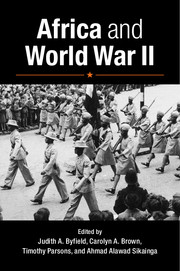Book contents
- Frontmatter
- Dedication
- Contents
- List of Contributors
- Acknowledgments
- Preface
- ONE INTRODUCTION
- TWO COLONIAL SUBJECTS AND IMPERIAL ARMIES
- THREE MOBILIZING COMMUNITIES AND RESOURCES FOR THE WAR EFFORT
- FOUR RACE, GENDER, AND SOCIAL CHANGE IN A TIME OF WAR
- FIVE EXPERIENCING WAR IN AFRICA AND EUROPE
- 19 American Missions in Wartime French West Africa: Travails of the Sudan Interior Mission in Niger
- 20 Fighting Fascism: Ethiopian Women Patriots 1935–1941
- 21 Defending the Lands of Their Ancestors: The African American Military Experience in Africa during World War II
- 22 French African Soldiers in German POW Camps, 1940–1945
- SIX WORLD WAR II AND ANTICOLONIALISM
- SEVEN CONCLUSION
- Index
20 - Fighting Fascism: Ethiopian Women Patriots 1935–1941
from FIVE - EXPERIENCING WAR IN AFRICA AND EUROPE
Published online by Cambridge University Press: 05 May 2015
- Frontmatter
- Dedication
- Contents
- List of Contributors
- Acknowledgments
- Preface
- ONE INTRODUCTION
- TWO COLONIAL SUBJECTS AND IMPERIAL ARMIES
- THREE MOBILIZING COMMUNITIES AND RESOURCES FOR THE WAR EFFORT
- FOUR RACE, GENDER, AND SOCIAL CHANGE IN A TIME OF WAR
- FIVE EXPERIENCING WAR IN AFRICA AND EUROPE
- 19 American Missions in Wartime French West Africa: Travails of the Sudan Interior Mission in Niger
- 20 Fighting Fascism: Ethiopian Women Patriots 1935–1941
- 21 Defending the Lands of Their Ancestors: The African American Military Experience in Africa during World War II
- 22 French African Soldiers in German POW Camps, 1940–1945
- SIX WORLD WAR II AND ANTICOLONIALISM
- SEVEN CONCLUSION
- Index
Summary
I could see him firing behind a growth of tall grass. Suddenly, he waved to me and fell. I went over to his side leaving my position. He was dead. Enemy soldiers were close by on the other side of the river. Before I started to pull away, I fired across the river and killed three men. I then pulled his body and his gun and withdrew. The rest of my men were safe. I went back to camp and the following day I buried him at the church of Dirma Gabriel.
Lekelesh Bayan, who watched her husband get killed, is just one of thousands of women who fought alongside Ethiopian men during the Italian occupation from 1935 to 1941. A decree issued on November 30, 1944, and enacted January 20, 1945, identified the three categories of combatants who contributed to the resistance during the occupation, and the medal each received. These three categories of combatants were the arbegna, the yewist arbegna, and sidetegna. The arbegna was a patriot who received the “Medal of the Campaign 1936–1941” for engaging the enemy in combat. The yewist arbegna was an underground patriot who operated in Italian organizational networks and passed on information and supplies to patriots in the field; he or she received the “Medal of the Patriots of the Interior.” The sidetegna was a refugee, who received the “Medal of the Patriot Refugees,” which recognized supporters of the resistance from outside the country. The largest number of refugees fled to Kenya and Sudan, but some of the aristocracy accompanied Emperor Haile Selassie to Britain and others went to Jerusalem. The courageous actions of medal recipients listed in the Book of Honor 1935–1941 had to be verified by fellow combatants.
The significance of women's contribution to the resistance was publicly recognized in the Book of Honor. Tsehai Berhane Sellassie estimates that approximately one-third of the names recorded there belong to women.
- Type
- Chapter
- Information
- Africa and World War II , pp. 383 - 400Publisher: Cambridge University PressPrint publication year: 2015



